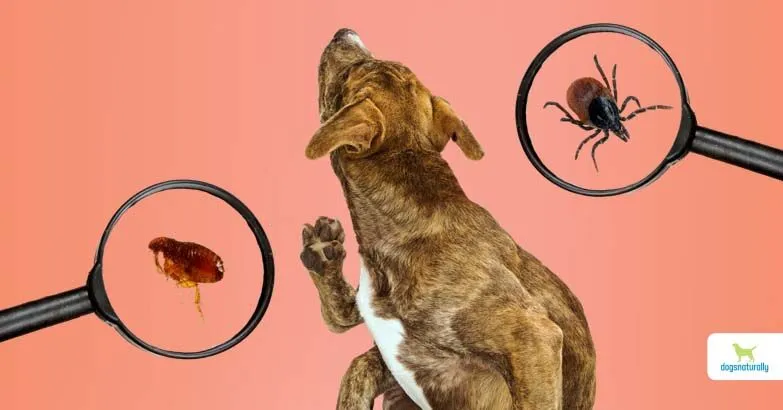Discover easy and effective dog parasite prevention strategies in 2025. Learn about the best flea, tick, and heartworm treatments to keep your dog healthy and protected.
Introduction: Protect Your Dog from Parasites in 2025
Every dog parent knows that parasites are more than just a nuisance — they can seriously harm your pet’s health. Fleas, ticks, heartworms, and intestinal worms threaten dogs year-round, causing discomfort and sometimes severe illnesses. As parasite threats evolve, so do prevention and treatment methods.
In 2025, dog parasite prevention has never been easier or more effective, thanks to advances in veterinary science and natural remedies. Whether you prefer vet-approved medications, natural solutions, or a combined approach, this guide breaks down everything you need to know about protecting your furry friend.

Read on to discover the top dog parasite control 2025 strategies, the safest and most effective treatments, and expert tips for year-round pet parasite protection.
Dog Flea and Tick Prevention is crucial to keep your dog healthy and comfortable. In 2025, using vet-approved treatments combined with regular grooming and a clean environment offers the best defense against these pesky parasites and the diseases they carry.
Heartworm Prevention for Dogs is vital to protect your pet from a serious and potentially fatal disease caused by parasitic worms transmitted by mosquitoes. In 2025, vets recommend monthly preventive medications—either oral or topical—that are safe and highly effective. Regular testing and timely treatment, along with reducing mosquito exposure, are key steps to keep your dog heartworm-free and healthy.
Why Dog Parasite Prevention Matters
H2: Common Parasites Affecting Dogs in 2025
- Fleas: Cause itching, allergies, and can transmit tapeworms.
- Ticks: Carry Lyme disease, ehrlichiosis, and other serious infections.
- Heartworms: Spread by mosquitoes and can be fatal if untreated.
- Intestinal worms: Roundworms, hookworms, and whipworms affect digestion and overall health.
H2: Risks of Ignoring Parasite Prevention
- Anemia and skin infections
- Transmission of diseases to humans and other pets
- Costly veterinary treatments and hospitalizations
- Long-term health complications or even death
Preventing these parasites is a crucial part of responsible dog ownership in 2025.
2025’s Best Parasite Treatments for Dogs
H2: Top Vet-Approved Solutions
H3: Flea and Tick Prevention
- Oral Medications:
Chewable tablets like NexGard, Simparica, and Bravecto provide 1-3 months of protection by killing fleas and ticks quickly after they bite. - Topical Spot-On Treatments:
Products such as Frontline Plus and Advantage apply directly to your dog’s skin and offer monthly protection against external parasites. - Collars:
Seresto flea and tick collars provide continuous protection for up to 8 months, releasing safe insecticides slowly.
H3: Heartworm Prevention
- Monthly pills like Heartgard or Trifexis contain medication that kills heartworm larvae before they mature.
- Injectable treatments like ProHeart offer up to 12 months of protection, ideal for busy dog owners.
Natural Dog Parasite Remedies: Safe Alternatives?
H2: Are Natural Remedies Effective?
While vet-approved medications remain the gold standard, many dog parents explore natural options to minimize chemicals:
- Diatomaceous Earth (Food Grade): Works by dehydrating fleas and ticks.
- Essential Oils: Oils like lavender and neem can repel parasites but must be used with caution due to toxicity risks.
- Apple Cider Vinegar: A topical spray believed to deter fleas.
Important: Always consult your vet before using natural remedies to ensure safety and efficacy.
H2: Dog Deworming Tips for Intestinal Parasites
- Regular fecal exams by your vet detect intestinal worms early.
- Deworming medications such as fenbendazole or praziquantel effectively eliminate most intestinal parasites.
- Puppies should be dewormed more frequently during early life stages.

Effective Dog Parasite Solutions: Year-Round Care
| Parasite Type | Prevention Method | Frequency | Notes |
|---|---|---|---|
| Fleas & Ticks | Oral meds, topical, collars | Monthly to 8 months | Choose based on dog lifestyle |
| Heartworms | Oral or injectable meds | Monthly or annually | Vital for dogs in mosquito areas |
| Intestinal Worms | Dewormers (vet-prescribed) | Every 3-6 months | Based on vet recommendation |
| Natural Remedies | Diatomaceous earth, oils | As needed | Use under vet supervision |
2025 Dog Parasite Care: Tips and Best Practices
H2: Practical Steps for Pet Parasite Protection
- Routine Vet Checkups: Early detection is key.
- Maintain Clean Living Spaces: Regularly wash bedding and vacuum to remove eggs and larvae.
- Outdoor Care: Keep lawns trimmed and use pet-safe yard treatments.
- Monitor Symptoms: Watch for excessive scratching, hair loss, coughing, or lethargy.
- Combine Methods: Use vet-approved treatments alongside safe natural remedies for comprehensive control.
Real-World Case Study: Successful Parasite Prevention
Meet Bella, a 3-year-old Labrador Retriever whose family struggled with persistent flea infestations every summer. After consulting their vet, they switched to a monthly oral medication paired with a flea collar and began weekly cleaning of Bella’s bedding. Over one year, Bella remained parasite-free, happier, and healthier, showcasing the power of integrated prevention.

Internal & Outbound Links
- Internal: Dog Health & Wellness Guide, Pet Care Tips 2025
- External: American Veterinary Medical Association – Parasite Prevention
- External: CDC – Parasites and Pets
FAQ Section (for Snippets)
1. What is the best way to prevent parasites in dogs?
The most effective prevention combines regular vet-approved medications for fleas, ticks, heartworms, and intestinal worms, alongside good hygiene and environmental management.
2. Can natural remedies replace veterinary parasite treatments?
Natural remedies may complement, but not replace, vet-approved medications. They often lack the proven efficacy and safety profile required to fully protect your dog.
3. How often should I give my dog parasite prevention medication?
Most flea, tick, and heartworm preventatives are given monthly, but some collars and injectables provide longer protection. Always follow your veterinarian’s advice.
4. What are common signs of parasites in dogs?
Symptoms include excessive scratching, hair loss, redness, coughing, vomiting, diarrhea, and lethargy. If you notice these signs, visit your vet promptly.
5. Are parasite preventatives safe for puppies and senior dogs?
Yes, many products are formulated for all life stages. Always choose age-appropriate medications and consult your vet to ensure safety.
Conclusion: Keep Your Dog Parasite-Free in 2025
Dog parasite prevention in 2025 is more accessible and effective than ever before. By choosing the right combination of treatments—whether vet-approved medications, natural remedies, or lifestyle adjustments—you can ensure your dog stays healthy, comfortable, and protected year-round.
Start your dog’s parasite prevention plan today and enjoy peace of mind knowing your best friend is safe. Have experiences or tips to share? Comment below or subscribe for more expert pet care advice!



